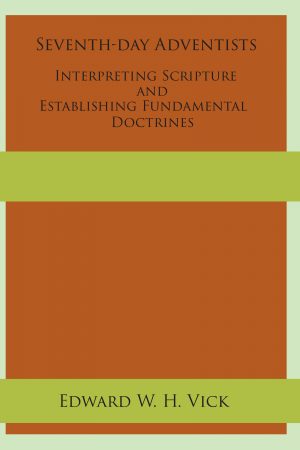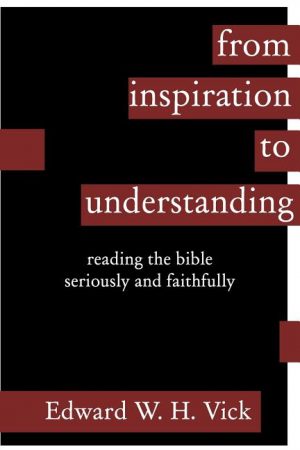Inspiration of Scripture: Meaning What?
by Edward W. H. Vick
l. Theory and Fact
The incentive for constructing theories of inspiration is to provide a basis for asserting the authority of the Bible. The Bible, so the argument goes, has authority because it is inspired, and it is inspired in the way the theory of inspiration accounts for it. Since we know how the scriptural books came into being and how they became part of the canon, we simply have to reject any theories which do not take this process into account, or which do not take it sufficiently into account.1 The question how in fact a scriptural writing was produced is decisive: ‘the real question is whether in fact such a writing was ever produced to form part of the Bible as we know it today. It is by this criterion, and not by its inner logic or consistency, that the relevance of the scholastic theology of inspiration must be judged.’2
The question how in fact a scriptural writing was produced is decisive. It is the criterion by which we must judge not only a scholastic theology of inspiration but any theology of inspiration. What is at issue is the relevance of any theology of inspiration. In view of what we now know concerning how the book came to its final form, we ask how a theory of inspiration can be helpful and what it is that it explains. We must keep the demands of what we know about the actual production of the literature always before our minds. We go seriously wrong if we do not constantly keep in mind what happened in the long story of the composition, compilation and acceptance of the Bible.
A theory of inspiration may make claims that are easily shown to be false by carefully examining the facts. It will either ignore or explain away the facts. Any satisfactory doctrine of inspiration will take account of these data, and be compatible with them. It will take notice of the history of the Bible, and its great complexity. It will not take as an a priori principle that the Bible is inspired, and then proceed to build on it, saying something like, ‘The Bible is inspired, therefore . . . .’ and then proceed to fill in the claim, e.g. there were certain ways in which it could not have been written. The last time I confronted the argument it went: ‘The Bible was inspired, therefore its writers could not have borrowed or copied from other sources in any shape or form.’
Rather one first asks: What, according to the evidence which is available, are the stages and the processes which took place before the end-product resulted? If you ask this historical question, you will have to keep an open mind. It is not fitting, nor is it honest (even if one is sincere) to say, ‘Scripture is inspired: therefore such-and-such did not happen.’ We must seriously take account of the historical data. We may not overlook any significant facts in building a doctrine of Scripture.
2. Some Well-established Facts about Scripture
Here, then, is a short list of some well-established facts about the Scriptures. They represent the dedicated efforts of competent and devoted scholars over several centuries:
- There is an enormous range of styles in the Scriptures. Some is literature of the very highest rank. Other is ungrammatical.
- There are literary relationships between some of the scriptural writings. That means that the similarities are so close that they come from common literary, i.e. written, sources. Simply, the writer copied from other people.
- Oral traditions lie behind our written documents.
- The traditions were reworked, often several times, before the product resulted as we now have it. The process of redaction was complex.
- It was a common practice for ancient authors to use pseudonyms. They hoped to give distinction to their work by connecting it with well-known figures.
- It is at times impossible to harmonize some biblical narratives with others.
- Each piece of writing has come from a quite particular historical setting. In the majority of cases we can reconstruct that particular setting and relate the writing to the setting.
- Often, e.g. in Genesis, Kings, Deuteronomy, several oral traditions were set side by side.
3. How the Books were Put Together
The following is a very brief and simplified summary of the series of events that went into the making of a book.
‘Literary studies lead to the conclusion that the process of composition of a typical Old Testament book was as follows: a. groups of unknown people composed oral form to help them with their work, their worship, their teaching; b. the oral forms were passed on through the generations, undergoing small changes from time to time; c. local men of letters wrote down the oral forms with which they were familiar; d. in some period of great literary activity, an editor collected these various literary products and combined them into one large work; e. the large work might be combined with others to make up a complete roll.’3
Any doctrine of inspiration must reckon with these facts, take into account this complex process by which the books came into being and the manner in which they came to have a special recognition in the church.
4. Norms for a Doctrine of Scripture
Even if we do not wish to enter into discussion of a particular viewpoint because we do not consider it an issue, it is sometimes worthwhile to say why it is acceptable or unacceptable. ‘Inerrancy’ is the term used to refer to the view which holds that the Bible is without error, that it must be interpreted in such a way that one may claim that it contains no kind of error. ‘Verbal inspiration’ is the theory which says that the words of the writing have their origin in the divine initiative. ‘Dictation’ is the theory that God ‘spoke’ the actual words of the biblical writer, who duly set them down. Hence, the words of Scripture are the words of God. Dictation theory is not always, but very often, called upon as support for a doctrine of scriptural inerrancy.
We shall now simply list reasons why a verbal, i.e. dictation, theory of inspiration is in error.
- The ‘writers’ do not claim to be inspired in this way.
- Only the originals would be so inspired. We don’t have them. Translations are of secondary value.
- It says nothing about the function of the books. Suppose they had been inspired in this way and left in a box and not yet discovered?
- Dictation theory is a caricature of the actual process of composition and transmission, which is quite varied indeed. It was ‘in many and varied ways’ that ‘God spoke’ [Hebrews 1:1]. Luke was not dictated to. Mark and other sources were copied by other scriptural writers.
- It makes the writers into puppets. The theory of accommodation is an obvious enough rationalization.
- Evidence from the writings themselves contradicts a verbal inspiration theory.
- It misconceives the idea of authority.
- Even if it were true it would not establish the authority of Scripture. It only tells us how the words got on to the page.
- The writings are not without error.
- It fails to consider the historical evidence and in doing so distorts basic definitions, for example, ‘writer,’ ‘author.’
- It does not do justice to the diversity of the biblical materials.
The question which raises a worthwhile issue is this: Can a duly modified theory of inspiration take account of the facts, some of which we have just mentioned? That is to say, Can a concept of ‘inspiration’ serve as a theological idea which can provide an adequate explanation of those convictions the Christian wishes to express about the Bible? Rejecting a theory of verbal inspiration, where dictation is the means, can we defend a modified theory of inspiration and account for the Christian attitude to and use of the Bible?
We can certainly set out check points for any such doctrine. By referring to the objections made above to a dictation theory of inspiration, we can derive some norms for an adequate doctrine of Scripture. Any adequate doctrine of the Bible must give a satisfactory account of the following:
- What the ‘writers’ themselves claim or do not claim.
- The history of the original text, of its transmission and translation.
- How the books actually function in the Christian community. How the church uses the writings.
- The complex and various ways in which the writings came to be, and in particular,
- The creative individuality and contextuality, i.e. the humanity, of the writers.
- Evidence from the writings concerning the origin of particular oracles, ideas and pronouncements.
- That the authority of the Bible is religious and relational.
- That the words of Scripture come to have such authority. This involves an extended process of recognition or canonization.
- That the writings are not inerrant.
- The history of the composition and compilation of the books.
- The great diversity of the biblical materials: including style, culture, religious and ethical views, form, and aim.
_____________________________________________________
1Cf. Leo XIII (Nov. 18th. 1893).
2Bruce Vawter, Biblical Inspiration. London: Hutchinson, 1972 3.1, p. 75.
3David Stacey, Interpreting the Bible, London, Sheldon Press, 1976. pp. 44-45.
-
 Seventh-day Adventists Interpreting Scripture and Establishing Fundamental DoctrinesPrice range: $6.49 through $9.99
Seventh-day Adventists Interpreting Scripture and Establishing Fundamental DoctrinesPrice range: $6.49 through $9.99 -
 Seventh-Day Adventists and the BiblePrice range: $6.49 through $9.99
Seventh-Day Adventists and the BiblePrice range: $6.49 through $9.99 -
 Product on saleWhat Is the Word of God?Price range: $1.39 through $1.99
Product on saleWhat Is the Word of God?Price range: $1.39 through $1.99 -
 When People Speak for GodPrice range: $11.69 through $17.99
When People Speak for GodPrice range: $11.69 through $17.99 -
 Product on saleFrom Inspiration to UnderstandingPrice range: $24.99 through $29.99
Product on saleFrom Inspiration to UnderstandingPrice range: $24.99 through $29.99 -
 InspirationPrice range: $19.49 through $39.99
InspirationPrice range: $19.49 through $39.99







One of the problems in asserting inspiration as a basis of authority for the Bible is that it competes for the same distinction with other scriptures of world religions which purport to be inspired as well. So we are left with either one is the true communication from God or all are. What is a devoted searcher to do?
I think the Bible declares in many ways what the psalmist proclaimed in Psa. 34:8 “O taste and see that the Lord is good; happy are those who take refuge in him. ” No external authority is needed for the one who tastes and finds. It is self-authenticating. Its theoretical truths become actual realities as they are relied upon over the years.
Do Christians with years in the faith need to be told that they need to believe the Bible because it’s inspired? I think not. They may start from that position, but they soon find that it is not enough, that their experiences eventually confirm the authority of the Bible.
Not surprisingly, adherents of the many world religions attest to the same reality; their scriptures are authenticated in their lives. For those whose faith is dependent on the superiority of the Bible, this then becomes a battle over whose book should prevail. This leads to the denunciation of adherents of other faiths who, like their book, are living inferior lives. Yet, the old adage that “someone with an experience will never be swayed by an argument” holds true.
I must give those of other religions the same recourse as I— If your book provides a meaningful life to you, God has blessed you. Go in peace.